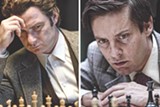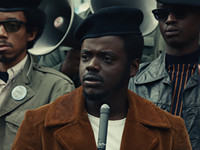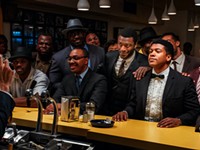[
{
"name": "500x250 Ad",
"insertPoint": "5",
"component": "15667920",
"parentWrapperClass": "",
"requiredCountToDisplay": "1"
}
]
While portraying tormented chess prodigy Bobby Fischer, Tobey Maguire delivers a solid performance in Edward Zwick's effective, if conventional biopic, "Pawn Sacrifice." Choosing to focus mostly on Fischer's 1972 showdown against Soviet grandmaster Boris Spassky (a terrific Liev Schreiber), Zwick and screenwriter Steven Knight paint Fischer's early life in broad strokes. We get a CliffsNotes version of Fischer's childhood living with his mother (Robin Weigert), whose ties to the Communist party landed their family on an FBI watch list. Though their relationship is a complicated one, his mother recognizes Bobby's talent for chess and finds a teacher, Carmine Nigro (Conrad Pla), to nurture his gifts. Under his tutelage, Bobby rises through the world of competitive chess.
At a time when tensions between the United States and the Soviet Union are at an all-time high, Fischer became an unlikely hero for Americans looking to confirm their country's superiority during its war of perceptions. Competing against the seemingly unbeatable Russians, Bobby comes across as a poor, plucky kid from Brooklyn taking on the whole Soviet empire.
Everything builds up to the World Chess Championship in Reykjavík, Iceland, and Fischer's series of matches against the stoic Spassky. Along the way Bobby receives support from his handlers, including his lawyer and manager, Paul Marshall (Michael Stuhlbarg), and his coach, Bill Lombardy (Peter Sarsgaard, reliably great). Together, the two men are tasked with keeping him focused and on course. A former chess champ turned priest, Lombardy seems to have led an interesting enough life to be the subject of his own film. It's this section, in which Fischer struggles to overcome his mental state (and occasionally uses it to his advantage) that the film is at its taut, nail-biting best.
It'd be easy for any actor playing Fischer to focus on the more eccentric details. Fischer suffered from undiagnosed mental illness and at the height of his popularity, he grew increasingly delusional, demonstrating paranoid behavior and psychosis. He grows fixated on anti-communist and anti-Semitic conspiracy theories (the latter especially ironic considering the fact that Fischer was himself Jewish). Knight never attempts to explain the source of this behavior, though there is an interesting discussion between Marshall and Lombardy that tiptoes into a discussion about whether the obsessive nature of chess attracts those with mental illness, or causes it. It all seems like a license to overact, but for the most part Maguire underplays it, making us wonder what's going on in his head, a choice that's particularly effective during the tense chess matches late in the film.
Fischer is a compelling figure and his story is a fascinating one, though Zwick often seems determined to smother it with blunt, by-the-numbers filmmaking. Attempting to convey Fischer's erratic mindset, he resorts to shaky, handheld camera moves and often relies on montages of 16mm faux newsreel footage and obvious musical cues to function as transitions between the film's sections. Still, the film's depiction of an unusual time in history when the attentions of the entire world could be focused on the outcome of a chess match is never less than gripping.










